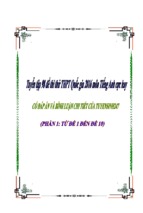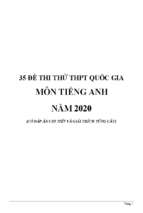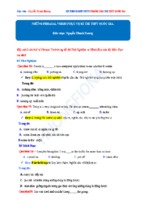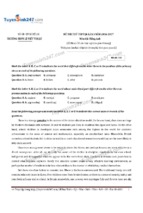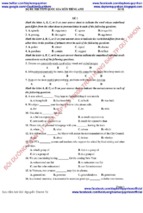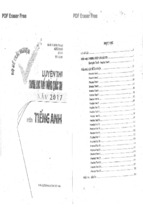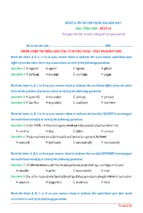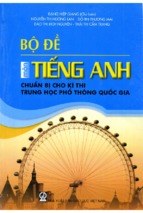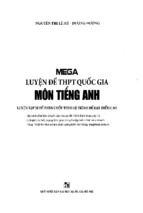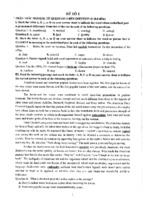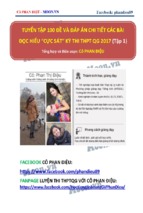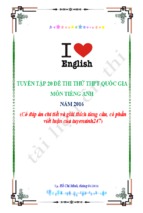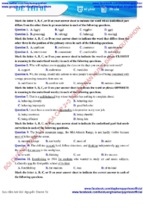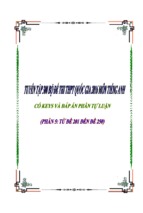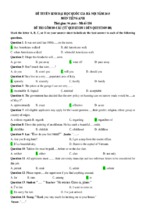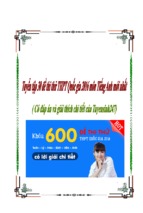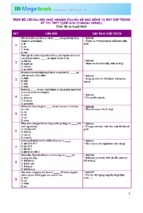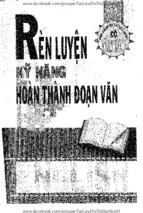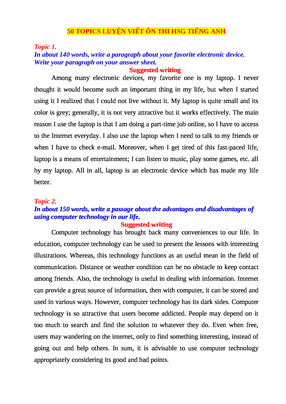TiếngAnh123.com
ĐỀ THI THỬ ĐẠI HỌC SỐ 17
Môn: TIẾNG ANH; Khối D
Thời gian làm bài: 90 phút, không kể thời gian phát đề
ĐỀ THI GỒM 80 CÂU (TỪ QUESTION 1 ĐẾN QUESTION 80)
I. Mark the letter A, B, C, or D on your answer sheet to indicate the word whose main
stress is placed differently from that of the rest in each of the following questions.
Question 1
A. account
B. current
C. agent
D. asset
Question 2
A. guidebook
B. sandstorm
C. landslide
D. bamboo
Question 3
A.workshop
B. surcharge
C. planet
D. debate
Question 4
A. bachelor
B. chemistry
C. refugee
D. compliment
Question 5
A. vacuum
B. neglect
C. compel
D. accept
II. Mark the letter A, B, C, or D on your answer sheet to indicate the correct answer to
each of the following questions.
Question 6: The government is encouraging everyone to__________water by not
washing their cars.
A. waste
B. save
C. spend
D. use
Question 7: They were__________about who should make the coffee.
A. quarrelling
B. disputing
C. objecting
D. opposing
Question 8: I'm not __________them staying with us, as long as it's only for a few days.
A. disagreed with
B. opposite
C. opposed to
D. objected to
Question 9: They had a(n)__________ , and never spoke to each other again.
A. dispute
B. objection
C. quarrel
D. opposition
Question 10: The players__________the referee's decision.
A. disagreed
B. disputed
C. objected
D. contradicted
Question 11: I've never had the slightest disagreement __________him
__________anything.
A. with / about
B. with / on
C. on / about
D. A and B
Question 12: She often ________with him in public.
A. disagrees
B. rows
C. accepts
D. opposite
Question 13: I'll ________ with you - you can have the car this weekend if I can have it
next weekend.
A. accept
B. offer
C. have in agreement
D. compromise
Question 14: 'These tablets really are________ . My headache’s much better now.
A. affective
B. effective
C. efficient
D. affected
Question 15: Ann refused to take________in the preparations for the school concert.
A. place
B. part
C. notice
D. offence
Question 16: ________ to have lunch with us today?
A. Would you like
B. Do you like
C. Will you like
D. Have you like
Question 17: My parents ________ go to work at weekends
A. have to
B. don't have to
C. must
D. mustn't
Question 18: Could you ________in this form, please, and sign it at the bottom?
A. fill
B. put
C. look
D. try
Question 19: "What a beautiful day!" "Yes, it's ________ that I'd like to take a walk."
A. such nice weather
B. so nice weather
C. too nice weather
D. nice weather so
Question 20: The more he tried to explain, ________ .
A. the most confused we got
B. the much confused we got
C. the more confused we got
D. the many confused we got
Question 21: Can you give me advice about ________?
A. to eat what
B. what should I eat
C. what for eating
D. what to eat
Question 22: ________ my complaint to the manager, the waiter was sacked.
A. Thanks to
B. Despite
C. Without
D. Because of
Question 23: My arm hurt so much. I felt sure I________it.
A. should have broken
B. must have broken
C. was breaking
D. have broken
Question 24: Parents should not let children________whatever they want.
A. to eat
B. eat
C. eating
D. to be eaten
Question 25: Nowadays, many people________going to the cinema to reading the same
story in a book.
A. would rather
B. like
C. would prefer
D. prefer
III. Mark the letter A, B, C, or D on your answer sheet to indicate the sentence that is
closest in meaning to each of the following questions.
Question 26: He started learning French six years ago.
A. He has learned French for 6 years.
B. It was six years ago did he start learning French.
C. He hasn't learnt French for 6 years.
D. It is six years since he has learned French.
Question 27: People believe he won a lot of money on the lottery.
A. He is believed that he won a lot of money on the lottery.
B. He won a lot of money on the lottery, it is believed.
C. He is believed to have won a lot of money on the lottery.
D. He was believed to win a lot of money on the lottery.
Question 28: Thieves stole all her priceless jewels.
A. She was stolen all her priceless jewels.
B. All her priceless jewels are stolen by thieves.
C. All her priceless jewels were robbed away from her.
D. She was robbed of all her priceless jewels.
Question 29: Susan said I ought to lie down for while.
A. Susan said that I should have lain for a while.
B. Susan suggested that I lie down for a while.
C. Susan suggested me to lie down for a while.
D. Susan ought to have lain down for a while.
Question 30: My sister worries so much about fitness that she wastes a lot of time and
money.
A. My sister wastes a lot of time and money though she worries so much about fitness.
B. My sister worries about fitness so that she wastes a lot of time and money.
C. Worrying too much about fitness, my sister wastes a lot of time and money.
D. Fitness worried, my sister wasted a lot of time and money.
IV. Mark the letter A, B, C, or D on your answer sheet to show the underlined part that
needs correction in each of the following questions.
Question 31: Simon finds (A) it hard (B) for making (C) friends with (D) other children.
A
B
C
D
Question 32: Peter did (A) a lot of sightsee (B)when he was (C) in Paris last summer(D).
A
B
C
D
Question 33: He is such a friend (A) person. He greets (B) me with a smile (C) every
time (D) I see him.
A
B
C
D
Question 34: Your (A) literary (B) work(C) is really a great successful (D).
A
B
C
D
Question 35:Her long blond (A) hair and her cute facial(B) expressions (C) made a deep
impress (D) on me.
A
B
C
D
V. Read the following passage and mark the letter A, B, C, or D on your answer sheet
to indicate the correct word for each of the blanks from 36 to 45.
The tourist industry is (36)________ to be the largest industry. Before 1950 one million
people traveled abroad each year but by the 1900s the figure (37)________to 400 million
every year.
(38)________ large numbers of tourists, however, are beginning to cause problems. For
example, in the Alps the skiers are destroying the mountains they came to enjoy. Even
parts of Mount Everest in the Himalayas are reported to be covered (39)________ old
tins, tents, and food that have been (40)________.
But at a time when we have (41)________freedom to travel than ever before, more and
more people are asking how they can enjoy their holidays (42)________causing
problems by spoiling the countryside. Now there is a new holiday (43)________called
"Holidays That Don't Cost The Earth". It tells you (44)________you can help the tourist
industry by asking your travel agent the right questions (45)________you go on holiday.
Question 36:
A. regarded
B. considered
C. seen
D. figured
Question 37:
A. had risen
B. rose
C. has risen
D. were rising
Question 38:
A. The
B. Those
C. These
D. Such
Question 39:
A. by
B. with
C. under
D. beneath
Question 40:
A. disposed
B. littered
C. thrown away
D. launched
Question 41:
A. greater
B. bigger
C. larger
D. better
Question 42:
A. apart from
B. instead of
C. without
D. hardly
Question 43:
A. guidance
B. guide
C. direction
D. instruction
Question 44:
A. where
B. what
C. when
D. how
Question 45:
A. before
B. when
C. as soon as
D. after
VI. Read the following passage and mark the letter A, B, C, or D on your answer sheet
to indicate the correct answer for each of the questions from 46 to 55.
In the world today, particularly in the two most industrialized areas, North America and
Europe, recycling is big news. People are talking about it, practicing it, and discovering
new ways to be sensitive to the environment. Recycling means finding ways to use
products a second time. The motto of the recycling movement is "Reduce, Reuse,
Recycle".
The first step is to reduce garbage. In stores, a shopper has to buy products in blister
packs, boxes and expensive plastic wrappings. A hamburger from a fast food restaurant
comes in lots of packaging: usually paper, a box, and a bag. All that packaging is wasted
resources. People should try to buy things that are wrapped simply, and to reuse cups and
utensils. Another way to reduce waste is to buy high-quality products. When low quality
appliances break, many customers throw them away and buy new ones - a loss of more
resources and more energy. For example, if a customer buys a high-quality appliance that
can be easily repaired, the manufacturer receives an important message. In the same way,
if a customer chooses a product with less packaging, that customer sends an important
message to the manufacturers. To reduce garbage, the throwaway must stop.
The second step is to reuse. It is better to buy juices and soft drinks in returnable
bottles. After customers empty the bottles, they return them to the store. The
manufacturers of the drinks collect the bottles, wash them, and then fill them again. The
energy that is necessary to make new bottles is saved. In some parts of the world,
returning bottles for money is a common practice. In those places, the garbage dumps
have relatively little glass and plastic from throwaway bottles.
The third step is being environmentally sensitive is to recycle. Spent motor oil can be
cleaned and used again. Aluminum cans are expensive to make. It takes the same amount
of energy to make one aluminum can as it does to run a color TV set for three hours.
When people collect and recycle aluminum (for new cans), they help save one of the
world's precious resources.
Question 46: What is the main topic of the passage?
A. how to reduce garbage disposal
B. what people often understand about the term 'recycle'
C. what is involved in the recycling movement
D. how to live sensitively to the environment.
Question 47: Which is described as one of the most industrialized areas?
A. Europe
B. Asia
C. Middle East
D. South America
Question 48: What does the word 'sensitive' in the phrase 'sensitive to the
environment' mean?
A. cautious
B. logical
C. friendly
D. responding
Question 49: People can do the following to reduce waste EXCEPT _____.
A. buy high-quality product
B. buy simply-wrapped things
C. reuse cups
D. buy fewer hamburgers
Question 50: Why is it a waste and customers buy low-quality products?
A. Because people will soon throw them away.
B. Because they have to be repaired many times.
C. Because customers change their ideas all the time.
D. Because they produce less energy.
Question 51: What does it mean 'Customers can vote with their wallets'?
A. they can choose the cheapest products
B. they can cast a lot to praise a producer.
C. they can ask people to choose products with less packaging
D. they can tell the producers which products are good for environment by buying them.
Question 52: The word 'motto' is closest in meaning to_____.
A. meaning
B. value
C. belief
D. reference
Question 53: What best describes the process of reuse?
A. The bottles are collected, washed, returned and filled again.
B. The bottles are filled again after being returned, collected and washed.
C. The bottles are washed, retuned, filled again and collected.
D. The bottles are collected, returned filled again and washed.
Question 54: The garbage dumps in some areas have relatively little glass and plastic
because_____.
A. people are ordered to return bottles.
B. returned bottles are few.
C. not many bottles are made of glass or plastic.
D. each returned bottle is paid.
Question 55: The word 'practice' is closest in meaning to_____.
A. drill
B. exercise
C. deed
D. belief
VII. Read the following passage and mark the letter A, B, C, or D on your answer sheet
to indicate the correct answer to each of the questions from 56 to 65.
A rather surprising geographical feature of Antarctica is that a huge freshwater lake,
one of the world's largest and deepest, lies hidden there under four kilometers of ice.
Now known as Lake Vostok, this huge body of water is located under the ice block that
comprises Antarctica. The lake is able to exist in its unfrozen state beneath this block of
ice because its waters are warmed by geothermal heat from the earth's core. The thick
glacier above Lake Vostok actually insulates it from the frigid temperatures on the
surface.
The lake was first discovered in the 1970s while a research team was conducting an
aerial survey of the area. Radio waves from the survey equipment penetrated the ice and
revealed a body of water of indeterminate size. It was not until much more recently that
data collected by satellite made scientists aware of the tremendous size of the lake; the
satellite-borne radar detected an extremely flat region where the ice remains level
because it is floating on the water of the lake.
The discovery of such a huge freshwater lake trapped under Antarctica is of interest to
the scientific community because of the potential that the lake contains ancient microbes
that have survived for thousands upon thousands of years, unaffected by factors such as
nuclear fallout and elevated ultraviolet light that have affected organisms in more
exposed areas. The downside of the discovery, however, lies in the difficulty of
conducting research on the lake in such a harsh climate and in the problems associated
with obtaining uncontaminated samples from the lake without actually exposing the lake
to contamination. Scientists are looking for possible ways to accomplish this.
Question 56: The word "hidden" in paragraph 1 is closest in meaning to_______.
A. undrinkable
B. untouched
C. unexploitable
D. undiscovered
Question 57: What is true of Lake Vostok?
A. It is completely frozen.
B. It is a saltwater lake.
C. It is beneath a thick slab of ice.
D. It is heated by the sun. Question
Question 58: Which of the following is closest in meaning to "frigid" in paragraph 1?
A. Extremely cold
B. Easily broken
C. Quite harsh
D. Lukewarm
Question 59: All of the following are true about the 1970 survey of Antarctica EXCEPT
that it_______.
A. was conducted by air
B. made use of radio waves
C. could not determine the lake's exact size
D. was controlled by a satellite
Question 60: It can be inferred from the passage that the ice would not be flat
if________.
A. there were no lake underneath
B. the lake were not so big
C. Antarctica were not so cold
D. radio waves were not used
Question 61: The word "microbes" in paragraph 3 could best be replaced by which of
the following?
A. Pieces of dust
B. Tiny bubbles
C. Tiny organisms
D. Rays of light
Question 62: Lake Vostok is potentially important to scientists because it _______.
A. can be studied using radio waves
B. may contain uncontaminated microbes
C. may have elevated levels of ultraviolet light
D. has already been contaminated
Question 63: The word "downside" in paragraph 3 is closest in meaning to_______.
A. bottom level
B. negative aspect
C. underside
D. buried section
Question 64: The last paragraph suggests that scientists should be aware of_______.
A. further discoveries on the surface of Antarctica
B. problems with satellite-borne radar equipment
C. ways to study Lake Vostok without contaminating it
D. the harsh climate of Antarctica
Question 65: The purpose of the passage is to _______.
A. explain how Lake Vostok was discovered
B. provide satellite data concerning Antarctica
C. discuss future plans for Lake Vostok
D. present an unexpected aspect of Antarctica's geography
VIII. Mark the letter A, B, C or D on your answer sheet to indicate the sentence that
expresses the best meaning formed by the given words
Question 66: used / tea / my / to / drink / parents / after / dinner.
A. My parents used to drink tea after dinner.
B. My parents used to drink after dinner tea.
C. My parents used to dinner after drink tea.
D. My parents used to drink dinner tea after.
Question 67: things / do / this / got / we / many / to / have / Sunday.
A. We have got this Sunday do many things to.
B. We have got this Sunday many things to do.
C. We have got many things to do this Sunday.
D. We have got many things this Sunday to do.
Question 68: their / airport / to / do / will / they / go / meet / tomorrow / the / son /.
A. They will go to meet their son to the airport tomorrow.
B. They will go to meet their son tomorrow to the airport.
C. They will go to the airport to meet their son tomorrow.
D. They will go tomorrow to the airport to meet their son.
Question 69: weather / place / camping / in / for / fine / a / is / good / Hyde Park /.
A. Hyde Park is a good place in fine weather for camping.
B. Hyde Park is a good place for camping in fine weather.
C. Hyde Park is for camping a good place in fine weather.
D. Hyde Park is in fine weather a good place for camping.
Question 70: enough / milk / do / have / for / sugar / you / the?
A. Do you have enough sugar for the milk?
B. Do you have sugar enough for the milk?
C. Do you have sugar for the enough milk?
D. Do you have the enough sugar for milk?
IX. Read the following passage and mark the letter A, B, C, or D on your answer sheet
to indicate the correct word for each of the blanks from 71 to 80.
During the (71)_______ years, many young people can at times be difficult to talk to.
They often seem to dislike being questioned. They may seem (72) _______ to talk about
their work at school. This is a normal (73) _______of this age. Though it can be very
hard for parents to understand, it is part of becoming (74) _______of teenagers trying to
be adult while they are still growing up. Young people are usually unwilling to talk if they
believe, that questions are trying to (75)_______up on them.
Parents should do their (76)_______to talk to their son and daughter about school, work
and future plans but should not (77)_______them to talk if they don't want to. Parents
should also watch for danger signs. Some young people in trying to be adult may
(78)_______ with sex, drugs, alcohol or smoking. Parents need to watch for any signs of
(79)_______ behavior which may be connected with these and help if (80) _______.
Question 71:
A. early
B. teenage
C. childhood
D. recent
Question 72:
A. unworried
B. unrestrained
C. unexpected
D. unwilling
Question 73:
A. development
B. appearance
C. circumstance
D. achievement
Question 74:
A. free
B. confident
C. dependent
D. independent
Question 75:
A. catch
B. check
C. keep
D. make
Question 76:
A. wel1
B. good
C. better
D. best
Question 77:
A. push
B. allow
C. put
D. expect
Question 78:
A. experiment
B. approach
C. experience
D. attach
Question 79:
A. unacceptable
B. unusual
C. normal
D. exemplary
Question 80:
A. proper
B. appropriate
C. important
D. necessary
---------- THE END ----------
- Xem thêm -


